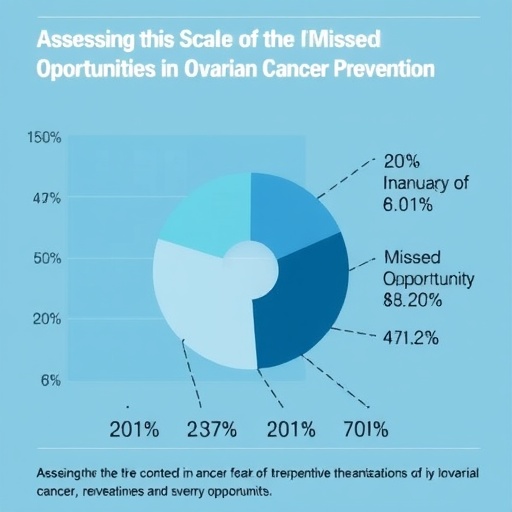A groundbreaking study published in JAMA Surgery sheds new light on the persistent challenges in managing high-grade serous ovarian cancer (HGSOC), a formidable subtype of ovarian carcinoma notorious for its aggressive nature and poor clinical outcomes. Despite advances in oncology, early detection and prevention strategies for HGSOC remain woefully inadequate, contributing to high mortality rates globally. This study critically examines missed opportunities in genetic risk assessment and preventive surgical interventions, revealing a substantial gap in the current clinical pathway that could otherwise serve as a lifeline for many patients at risk.
High-grade serous ovarian cancer accounts for the majority of ovarian cancer deaths, primarily due to its stealthy progression and late-stage diagnosis. The absence of reliable screening methods has rendered early intervention nearly impossible. The study highlights that a significant proportion of patients diagnosed with HGSOC were not offered genetic counseling or testing, despite established guidelines recommending such assessments for risk stratification. This oversight not only jeopardizes timely treatment for patients but also diminishes the potential for early preventive measures within their families.
Genetic testing, particularly for BRCA1 and BRCA2 mutations as well as other homologous recombination deficiency markers, plays a pivotal role in identifying individuals at elevated risk for developing HGSOC. The study portrays a concerning picture: many providers are either unaware or unable to facilitate genetic testing referrals efficiently. This gap underscores systemic flaws within healthcare delivery, including issues related to provider education, resource allocation, and patient accessibility. The researchers advocate for integrating streamlined genetic risk assessments into routine gynecological oncology practices to maximize early detection efforts.
The implications of missed genetic testing extend beyond individual patients to their relatives, who might carry hereditary mutations conferring a heightened cancer risk. Familial genetic counseling and cascade testing are essential tools for broadening preventive care. The study illustrates that surgical prevention strategies, such as risk-reducing salpingo-oophorectomy, are underutilized in populations identified as high-risk through genetic predisposition. This gap represents a critical missed opportunity for primary prevention that could drastically decrease HGSOC incidence.
In the absence of effective screening tools like serum biomarkers or imaging modalities capable of detecting early-stage HGSOC, prevention becomes paramount. The study’s findings reinforce the urgent need for healthcare systems to adopt comprehensive risk assessment protocols encompassing genetic testing, counseling, and timely surgical interventions. Such an integrated approach could substantially curtail disease incidence and improve survival outcomes. The multifaceted nature of missed opportunities revealed by the study indicates that targeted education and policy reforms are necessary to eradicate systemic deficiencies.
The researchers also address the limitations of current chemotherapy regimens and targeted treatments for HGSOC, which, although improving survival, are often administered after the disease has advanced beyond curative stages. This reality enhances the importance of primary prevention. Implementing guidelines consistently across healthcare settings could prevent diagnoses that arise too late for effective therapeutic intervention. The study’s emphasis on a “full spectrum” approach underlines how piecemeal strategies fall short in confronting a disease as complex as HGSOC.
Furthermore, the study advocates for increased awareness among clinicians regarding hereditary cancer syndromes linked to ovarian cancer. This includes appropriate referral mechanisms to genetic counselors and enhanced diagnostic workflows. By fostering collaborations between oncologists, geneticists, and surgeons, health systems can create multidisciplinary frameworks to address various aspects of cancer prevention and early detection. The synergistic potential of such collaborations remains vastly untapped in several institutions, according to the findings.
This study also brings to light the socio-economic and racial disparities influencing access to genetic testing and preventive care. Patients from underserved populations face systemic barriers, including limited insurance coverage, cultural mistrust, and logistical obstacles, which exacerbate the issue of missed risk assessments. The authors call for equity-focused initiatives to ensure that all patients, regardless of demographic factors, can benefit from advances in genomic medicine and risk-reducing strategies.
Moreover, the research underscores the necessity for real-world data collection and quality metrics that track adherence to genetic counseling guidelines. Implementing robust auditing systems could reveal gaps in patient management and stimulate quality improvement initiatives. By benchmarking performance across institutions, healthcare providers can optimize patient pathways and standardize care delivery, minimizing the risk of missed genetic testing opportunities.
Another critical takeaway from the study is the evolving landscape of genetic testing technologies, including next-generation sequencing panels that allow comprehensive mutation profiling. Expanding the genetic testing repertoire beyond BRCA mutations enables identification of a wider spectrum of hereditary risk alleles. However, the study warns that technological advancements alone cannot address underutilization without concomitant efforts in healthcare policy, education, and patient engagement.
In conclusion, this meticulous investigation into missed preventive opportunities in high-grade serous ovarian cancer diagnosis and management calls for a paradigm shift in oncological care. Advancing the integration of genetic testing, counseling, and preventive surgery into standard practice is essential to break the cycle of late-stage diagnosis and high mortality. Addressing systemic barriers and fostering multidisciplinary collaboration will be crucial in transforming prevention into a realistic and effective strategy against HGSOC. The study stands as a clarion call to healthcare professionals, researchers, and policymakers committed to eradicating this devastating cancer.
Subject of Research: High-grade serous ovarian cancer prevention and genetic risk assessment
Article Title: Not provided
News Publication Date: Not provided
Web References: Not provided
References: (doi:10.1001/jamasurg.2025.2810)
Image Credits: Not provided
Keywords: Ovarian cancer




